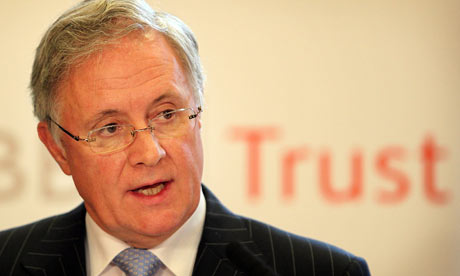
The BBC has today said it has "no intention" of charging for online news, in a declaration that is unlikely to please James Murdoch and his father Rupert as they prepare to start charging for News Corporation content on the internet.
Sir Michael Lyons, the BBC Trust chairman, said the corporation has "no intention of diluting BBC commitment to universal access to free news online" as he outlined the areas director general Mark Thompson's ongoing strategic review will cover.
The BBC's internet news operations came under fire in August at the MediaGuardian Edinburgh International Television Festival from James Murdoch, chairman and chief executive of News Corporation in Europe and Asia, who accused the corporation of "throttling" the market and preventing its competitors from launching or expanding their own services online.
News International, the News Corp subsidiary that owns the company's British newspapers, including the Sun and the Times, is planning to start charging for its journalism online.
Lyons said today that the BBC Trust "recognises external concerns over scale and growth of BBC online operations". But he added: "Equally, it's an immensely popular service with audiences and an important tool for the economy."
Lyons said he wanted Thompson to ask what "licence fee payers really expect to get from their licence fee and what they might be surprised to see the BBC doing in the online world".
He indicated that some areas, such as the iPlayer and news online, are safe when he asked: "Beyond the core offer of news, sport, education, children's and the iPlayer, which parts of the online service are essential to the BBC's mission and which could be stopped?"
However, Lyons also questioned the future of content created for online that is not directly related to specific BBC programmes, asking, "where should the boundary be drawn" between this and "the online expression or extension of BBC programming"?
Lyons also said the BBC Trust has asked Thompson to look at how the corporation should "serve all audiences" with "fresh and new" programmes, not a "diet of the predictable and comfortable", while "nurturing home-grown talent... across the full range of genres".
Other questions include "does increased quality and distinctiveness come at a price?" and how can the BBC be "more open", both for "programme-makers and for audiences".
Another concern expressed by the trust is that "if it spreads itself too thinly the BBC may lose focus on the core mission to provide fresh, new, high-quality content".
The BBC is consulting its rivals about the strategic review, which was announced by Lyons in September, and Thompson is due to deliver his initial thoughts in the new year.
John McVay, the Pact chief executive, said: "Rather than making cuts in content, the BBC should look at its own fixed overheads and in-house capacity. Looking to make cuts online and on-air is not the compact the BBC has with the licence fee payer."
• To contact the MediaGuardian news desk email editor@mediatheguardian.com or phone 020 3353 3857. For all other inquiries please call the main Guardian switchboard on 020 3353 2000.
• If you are writing a comment for publication, please mark clearly "for publication".

